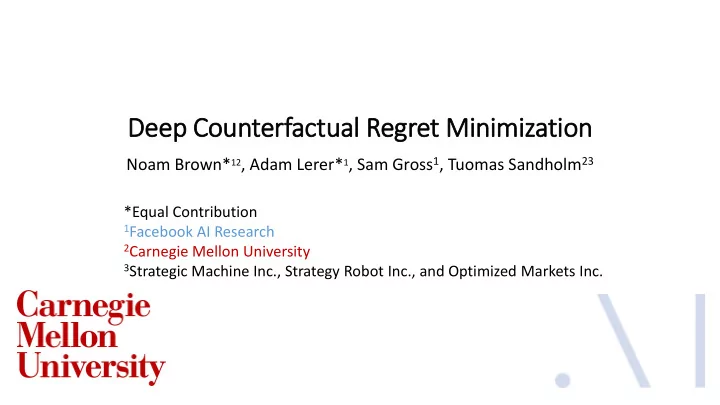

Deep Counterfactual Regret Min inimization Noam Brown* 12 , Adam Lerer* 1 , Sam Gross 1 , Tuomas Sandholm 23 *Equal Contribution 1 Facebook AI Research 2 Carnegie Mellon University 3 Strategic Machine Inc., Strategy Robot Inc., and Optimized Markets Inc.
Counterfactual Regret Min inimization (C (CFR) [Zin inkevich et al al. Neu eurIP IPS-07] 07] • CFR is the leading algorithm for solving partially observable games • Iteratively converges to an equilibrium • Used by every top poker AI in the past 7 years, including Libratus • Every single one used a tabular form of CFR • This paper introduces a function approximation form of CFR using deep neural networks • Less domain knowledge • Easier to apply to other games
Example of Monte Carlo CFR [La Lanctot et al al. NeurIP rIPS-09] 09] • Simulate a game with one player designated as the traverser C 𝑄 1 𝑄 2 C 25
Example of Monte Carlo CFR [La Lanctot et al al. NeurIP rIPS-09] 09] • Simulate a game with one player designated as the traverser C • After game ends, traverser sees how much better she could have done by 𝑄 1 choosing other actions 𝑄 2 𝑄 2 C 𝑄 1 25 100
Example of Monte Carlo CFR [La Lanctot et al al. NeurIP rIPS-09] 09] • Simulate a game with one player designated as the traverser C • After game ends, traverser sees how much better she could have done by 𝑄 1 choosing other actions • This difference is added to the 𝑄 2 𝑄 2 action’s regret . In future iterations, actions with higher regret are chosen C 𝑄 1 with higher probability 25 100
Example of Monte Carlo CFR [La Lanctot et al al. NeurIP rIPS-09] 09] • Simulate a game with one player designated as the traverser C • After game ends, traverser sees how much better she could have done by 𝑄 1 choosing other actions • This difference is added to the 𝑄 2 𝑄 2 action’s regret . In future iterations, actions with higher regret are chosen C 𝑄 1 with higher probability • Process repeats even for 50 120 25 100 hypothetical decision points
Prior Approach: Abstraction in Games Original game Bucketed together Abstracted game • Requires extensive domain knowledge • Several papers written on how to do abstraction just in poker • Difficult to extend to other games
Deep CFR • Input: low-level features (visible cards, observed actions) • Output: estimate of action regrets • On each iteration: 1. Collect samples of action regrets, add to a buffer 2. Train a network to predict regrets 3. Use network’s regret estimates to play on next iteration
Deep CFR • Input: low-level features (visible cards, observed actions) • Output: estimate of action regrets • On each iteration: 1. Collect samples of action regrets, add to a buffer 2. Train a network to predict regrets 3. Use network’s regret estimates to play on next iteration • Theorem: With arbitrarily high probability, Deep CFR converges to an 𝜗 -Nash equilibrium in two-player zero-sum games, where 𝜗 is determined by prediction error
Experimental results in limit Texas hold’em • Deep CFR produces superhuman performance in heads-up limit Texas hold’em poker • ~10 trillion decision points • Once played competitively by humans • Deep CFR outperforms Neural Fictitious Self Play (NFSP), the prior best deep RL algorithm for partially observable games [Heinrich & Silver arXiv-15] • Deep CFR is also much more sample efficient • Deep CFR is competitive with domain-specific abstraction algorithms
Conclusions • Among algorithms for non-tabular solving of partially-observable games, Deep CFR is the fastest, most sample-efficient, and produces the best results • Uses less domain knowledge than abstraction-based approaches, making it easier to apply to other games
Recommend
More recommend